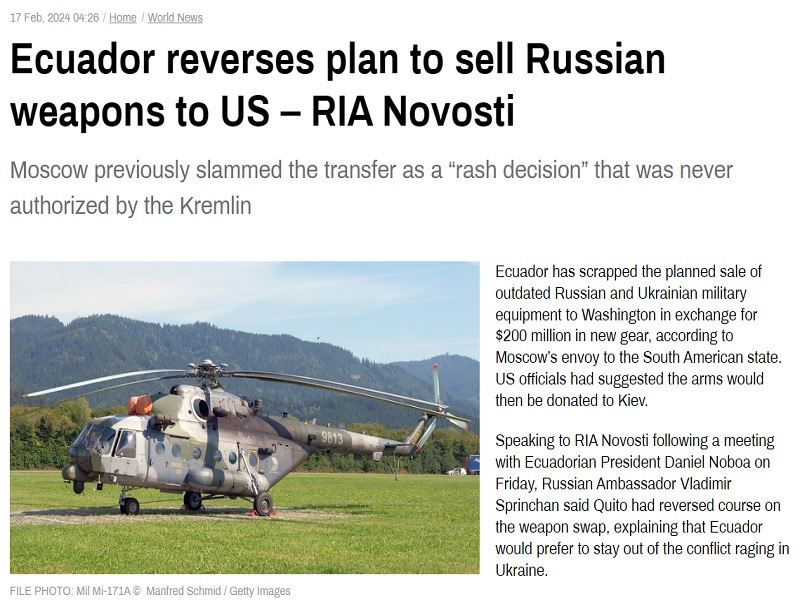The successful resolution of this dispute would show other Latin American states that the economic, and especially reputational, costs of doing the US’ bidding against Russia aren’t worth it.
Russian Ambassador to Ecuador Vladimir Sprinchan told RIA Novosti late last week that his hosts will no longer send old Russian arms to Ukraine like President Daniel Noboa agreed to do last month in exchange for modern American ones. He was pressured into that decision out of desperation to defeat the drug gangs that tried to take control of the country. Shortly after, Russia suspended banana imports from Ecuador on epidemiological pretexts, which threatened to hit over $700 million worth of exports.
While those potential losses are just a fraction of Ecuador’s $32 billion worth of exports from 2022, the timing of that move was apparently enough to convince Ecuador that it was a politically driven response to agreeing to send old Russian arms to Ukraine, thus prompting Noboa to reconsider this policy. That explains why Ambassador Sprinchan said after his meeting with him last week that “Ecuador’s position is not to send weapons and ammunition to hot zones” and that this will be formally declared soon.
Around the same time, Russia’s agricultural watchdog lifted its ban on importing Ecuadorian bananas, though not before the country ordered 20 tons of them from India. That South Asian state is the world’s largest producer but has struggled to break into the international market that’s dominated by Ecuador. Russia’s imports therefore represent an opportunity for India expand its presence there and eventually in the rest of the former Soviet Republics as well.
Considering that Russia will now once again import Ecuadorian bananas, the forthcoming Indian ones will no longer have the monopoly that they might have expected when the abovementioned deal was clinched, but hopefully the prices will be competitive enough for them remain on Russian shelves. It’s in Russia’s national interests to diversify trade with India beyond its present dependence on arms and energy exports to that country and importing more agricultural goods from India can help a lot with this.
That said, it’s also just as important for Russia to reward Ecuador for apparently reconsidering its decision to send old Russian arms to Ukraine. Even though those wares wouldn’t change the conflict’s dynamics in Kiev’s favor, it was still an unfriendly move for Quito to make despite this arguably being done under duress and in desperation as was explained. The best-case scenario is that Ecuador formally reverses its policy, banana exports to Russia continue, but Russia diversifies this dependence via India.
The successful resolution of this dispute would show other Latin American states that the economic, and especially reputational, costs of doing the US’ bidding against Russia aren’t worth it. Ecuador was the first to break ranks with the region’s refusal to send old Russian arms to Ukraine in exchange for new American ones since this proposal was first made over a year ago, and it only agreed due to desperation and duress. After this snafu, however, few if any are expected to follow suit like the US expected.




